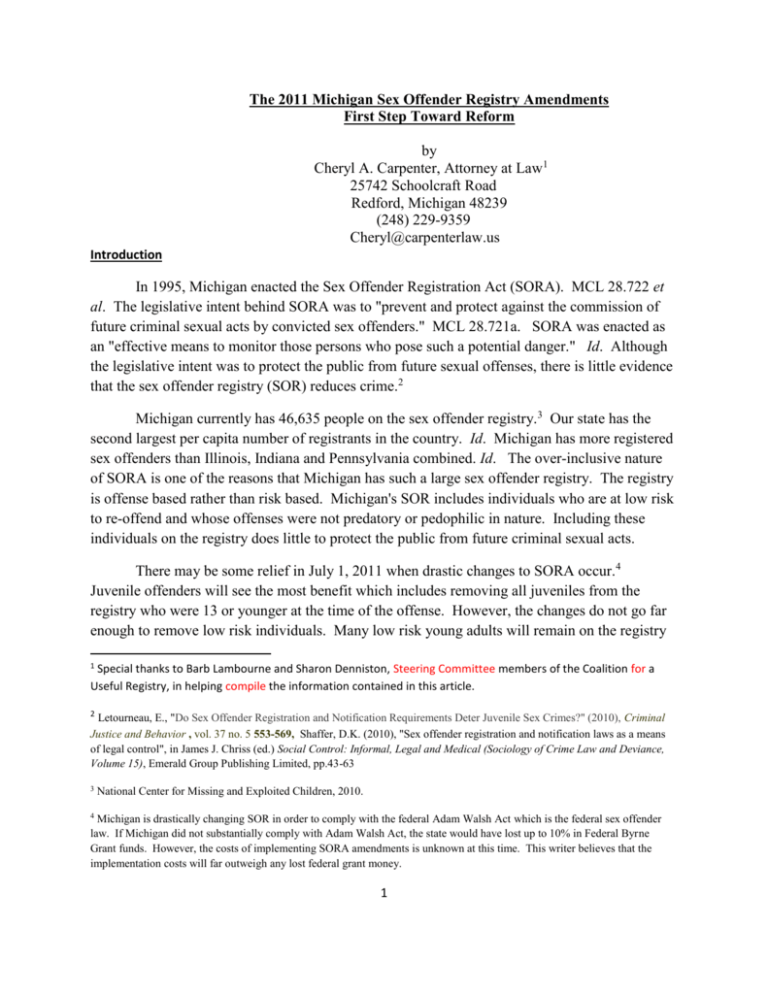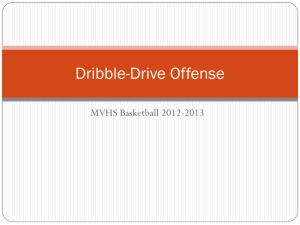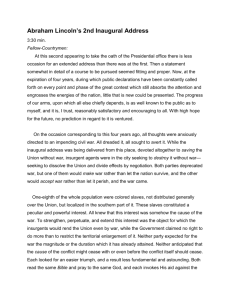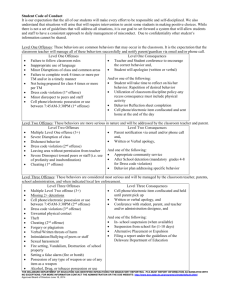
The 2011 Michigan Sex Offender Registry Amendments
First Step Toward Reform
by
Cheryl A. Carpenter, Attorney at Law1
25742 Schoolcraft Road
Redford, Michigan 48239
(248) 229-9359
Cheryl@carpenterlaw.us
Introduction
In 1995, Michigan enacted the Sex Offender Registration Act (SORA). MCL 28.722 et
al. The legislative intent behind SORA was to "prevent and protect against the commission of
future criminal sexual acts by convicted sex offenders." MCL 28.721a. SORA was enacted as
an "effective means to monitor those persons who pose such a potential danger." Id. Although
the legislative intent was to protect the public from future sexual offenses, there is little evidence
that the sex offender registry (SOR) reduces crime.2
Michigan currently has 46,635 people on the sex offender registry.3 Our state has the
second largest per capita number of registrants in the country. Id. Michigan has more registered
sex offenders than Illinois, Indiana and Pennsylvania combined. Id. The over-inclusive nature
of SORA is one of the reasons that Michigan has such a large sex offender registry. The registry
is offense based rather than risk based. Michigan's SOR includes individuals who are at low risk
to re-offend and whose offenses were not predatory or pedophilic in nature. Including these
individuals on the registry does little to protect the public from future criminal sexual acts.
There may be some relief in July 1, 2011 when drastic changes to SORA occur.4
Juvenile offenders will see the most benefit which includes removing all juveniles from the
registry who were 13 or younger at the time of the offense. However, the changes do not go far
enough to remove low risk individuals. Many low risk young adults will remain on the registry
1
Special thanks to Barb Lambourne and Sharon Denniston, Steering Committee members of the Coalition for a
Useful Registry, in helping compile the information contained in this article.
2
Letourneau, E., "Do Sex Offender Registration and Notification Requirements Deter Juvenile Sex Crimes?" (2010), Criminal
Justice and Behavior , vol. 37 no. 5 553-569, Shaffer, D.K. (2010), "Sex offender registration and notification laws as a means
of legal control", in James J. Chriss (ed.) Social Control: Informal, Legal and Medical (Sociology of Crime Law and Deviance,
Volume 15), Emerald Group Publishing Limited, pp.43-63
3
National Center for Missing and Exploited Children, 2010.
4
Michigan is drastically changing SOR in order to comply with the federal Adam Walsh Act which is the federal sex offender
law. If Michigan did not substantially comply with Adam Walsh Act, the state would have lost up to 10% in Federal Byrne
Grant funds. However, the costs of implementing SORA amendments is unknown at this time. This writer believes that the
implementation costs will far outweigh any lost federal grant money.
1
and their registration will increase from 25 years to life. Also, there is no removal provision for
low risk adult offenders who had minor sexual offenses or those adults who prove that they have
been rehabilitated. The lack of a general petitioning process for removal is a big flaw in the new
law. Further, those listed on the registry will face far greater hardships and obstacles in their
lives under the new law.
Criminal defense attorneys must make it a priority to learn the new SORA laws so to
educate not only their clients but also judges and prosecutors. It is ineffective assistance of
counsel not to inform a client that a plea or guilty verdict will trigger SOR. People v. Fonville.
--- N.W.2d ----, 2011 WL 222127, Mich.App., January 25, 2011 (NO. 294554). It is also very
important for defense counsel to fully inform their clients the extreme hardships they will face as
a registered sex offender. Being a listed offender entails much more than verifying an address
and having a photograph on the registry. SOR impacts every area of a registrant’s life - personal
relationships, employment, housing, travel, and mental health. Parents who are registered sex
offenders cannot participate in their child's school activities because the student safety zone does
not allow them to "loiter" within a 1000 feet of an elementary, middle or high school. School
districts and law enforcement liberally construe loiter to include parent/teacher conferences,
sporting activities and the like. SOR is not a collateral consequence of a sexual conviction. It is
a direct, punitive consequence that has major implications on a person's life.
Below is a summary of the amendments to SORA that take effect on July 1, 2011.
SORA requirements are for those “convicted” of a "listed offense" MCL 28.722(b) :
Below are the definitions of which individuals must register as a sex offender:
1. Having a judgment of conviction or a probation order entered in any court having jurisdiction
over criminal cases, including (an adult) conviction subsequently set-aside for a listed
offense. (see tiers below for all listed offenses).
2. Either of the following:
a. Being assigned to youthful trainee status (HYTA) before 10/1/2004. This does not apply
if a petition is granted at any time allowing individual to discontinue registration,
including reduced registration periods that extend to or past July 1, 2011.
b. Being assigned to youthful trainee status (HYTA) before 10/1/2004 if the individual is
convicted of any other felony on or after July 1, 2011.
3. Having a juvenile adjudication if BOTH of the following apply (this applies to both in-state
and out-of-state adjudications):
a. The individual was 14 or older at the time of the offense.
b. The offense would classify the individual as a Tier III offender.
2
Tier Based Registry - Life, 25 or 15 years
Offenders will be placed in tiers based on their conviction offense. The date of the
conviction is the start date for registry purposes. However, the registration period is stopped
during any period of incarceration and does not count toward offenders length of registration.
Tier I important information
-Register for 15 years with petitioning opportunities for removal after 10 years. MCL
28.725(10).
-Non-public list that is only available to law enforcement. MCL 28.728(4)(c)
-only non-public if single conviction offense; if the offender has two convictions arising out of
one case then the offender's registry is public
-Must verify their domicile or residence one time a year, between January 1st to 15th.
MCL 28.725a(a)
-Includes attempts or conspiracy for any of the below
Tier I Offenses
750.145c(4)
A person who knowingly possesses any child sexually abusive
material.
(currently 25 year registration)
750.335a(2)(B)
Indecent exposure with fondling of self, if the victim is a minor
(currently 25 year registration)
750.349b
Unlawful imprisonment/restraint if the victim is a minor
750.520e
4th Degree CSC if the victim is 18 or older
(currently 25 year registration)
750.520g(2)
Assault w/ Attempt to commit (touch) if the victim is 18 or older
(currently 25 year registration)
750.539j
Surveillance of or distribution, dissemination, or transmission of
recording, photograph, or visual image of individual having
reasonable expectation of privacy, if the victim is a minor.
(new registerable offense)
750.10A
Anyone who was at the time of the offense is a sexually
delinquent person
28.722(B)(s)(vi)
Catch-all provision (any other violation of a law of this state or a
local ordinace of a municipality, other than a tier II or tier III
offense, that by its nature constitutes a sexual offense against
an individual who is a minor (person less than 18 years old)
3
Tier II Important Information
-Register for 25 years. MCL 28.725(11).
-Public list available on the internet.
-Must verify their domicile or residence two times a year, between January 1st to 15th
and July 1st to 15th. MCL 28.725a(b)
-Includes tier I offender subsequently convicted of another tier I offense
-includes attempts or conspiracies of any of the below
Tier II Offenses
750.145a
A person
who accosts, entices, or solicits a child less than 16 years of
age… with the intent to induce or force that child or individual to commit
an immoral act.
750.145b
A person who accosts, entices, or solicits a child less than 16 years of
age… with the intent to induce or force that child or individual to commit
an immoral act… with a prior conviction.
750.145c(2)
A person who persuades, induces, entices, coerces, causes, or knowingly
allows a child to engage in a child sexually abusive activity for the
purpose of producing any child sexually abusive material.
(currently lifetime registration)
750.145c(3)
A person who distributes or promotes, or finances the distribution or
promotion of, or receives for the purpose of distributing or promoting, or
conspires, attempts, or prepares to distribute, receive, finance, or promote
any child sexually abusive material.
(currently lifetime registration)
750.145d(1)(A) Use of the internet to solicit or commit an immoral act except for a
violation arising out of a violation of 750.157c (coercing a minor to
commit a felony)
750.158
Sodomy against a minor; unless either of the following applies: (A) victim
consented, was 13 up to the age of 16 and no more than 4 years age
difference OR (B) victim consented, was 17 or older and was not under
custodial authority of the individual.
750.338, 750.338a or 750.338b Gross indecency, victim 13 up to the age of 18, unless
either of the following applies: (A) victim consented, victim 13 up to the
age of 16, not more than 4 years age difference, OR (B) victim consent,
4
victim 16 or 17 and victim was not under custodial authority of the
individual.
750.448
Solicit to commit prostitution if the victim is a minor
750.455
Pandering - enticing female to become a prostitute.
750.520c
2nd Degree CSC if the victim is 18 or older
750.520c
2nd Degree CSC if victim is 13 up to the age of 18.
750.520e
4th Degree CSC if victim is 13 up to the age of 18.
750.520g(2)
Assault w/Attempt to Commit (touch) if victim is13 up to the age of 18.
5
Tier III important information
-Register for lifetime. MCL 28.725(12).
-Public list available on the internet.
-Must verify their domicile or residence four times a year, between January 1st to 15th,
April 1st to 15th, July 1st to 15th and October 1st to 15th. MCL 28.725a(c)
-includes attempts or conspiracies for any of the below
Tier III Offenses
750.338
Gross indecency between males, victim under 13
(currently 25 year registration)
750.338a
Gross indecency between females, victim under 13
(currently 25 year registration)
750.338b
Gross indecency between male and female, victim under 13
(currently 25 year registration)
750.349
Kidnapping committed against a minor
750.350
Kidnapping victim under 14
750.520b
1st Degree CSC, does not apply when a court determines victim consented,
victim 13 up to the age of 16, less than 4 yr. age difference.
750.520c
2nd Degree CSC, victim under the age of 13
750.520d
3rd Degree CSC, does not apply when a court determines victim
consented, victim 13 up to the age of 16, less than 4 yr. age difference.
(currently 25 year registration)
750.520e
4th Degree CSC committed by individual 17 or older against victim less
than 13. (It is important to note that persons adjudicated in juvenile
court of CSC 4th do not have to register)
750.520g(1)
Assault w/Attempt to commit penetration, does not apply when a court
determines victim consented, victim 13 up to the age of 16, less than 4 yr.
age difference.
(currently 25 year registration)
750.520g(2)
Assault w/Attempt to Commit touch, victim under the age of 13
(currently 25 year registration)
6
Catch-All Provision
A problem for criminal defense attorneys who attempted to plea bargain a sex crimes
case was the catch-all provision of SORA. This provision requires individuals to register for
"any other violation of a law . . . that by its nature constitutes a sexual offense against an
individual who is less than 18 years of age." (old law, MCL 28.722(e)(xi)). When a defense
attorney and prosecutor negotiated a plea bargain from a sexual offense to a non-sexual offense
such as dismissal of a criminal sexual conduct third degree victim 13-15 in exchange for a guilty
plea of an assault and battery charge, the catch-all provision would trigger registration for 25
years if the victim was under the age of 18.
The new SORA amendment now places the catch-all provision offenders in tier I: "Any
other violation of a law of this state or a local ordinance of a municipality, other than tier II or
tier III offense, that by its nature constitutes a sexual offense against an individual who is a
minor." MCL 28.722(s)(vi). Minor is defined as a person less than 18 years of age at the time
the offense was committed. MCL 28.722(l).
For catch-all offender, the SORA requirements will not be as onerous as they were with
the old law. The offender will be placed in tier I which requires 15 year registration on a nonpublic list unless the catch-all offense is a tier II or III offense. The catch-all provision offenses
will rarely be tier II or III offenses since catch-all provision usually captured offenders who pled
guilty to a non sexual offense which are not listed offenses for SORA purposes.
7
Juveniles under age of 14 will be removed from registry
Juveniles under age of 14 are excluded from definition of "convicted" for SORA
purposes thus they are not required to register. MCL 28.722(b)(iii). In order to qualify for
removal, the juvenile’s case cannot have been a designated case (juvenile waived to adult circuit
court).
This is an important change in SORA because these offenders were at the lowest risk for
re-offending and have the highest percentage of success in sexual abuse treatment programs.
Further, the majority of juveniles under age of 14 who were adjudicated of a listed offense were
simply engaged in juvenile sexual exploration, not predatory conduct.
It is unclear whether MSP will automatically remove these juvenile offenders or if a court
order is needed. The statute states speaks of petitioning process and court orders for these
juveniles: the court "shall" grant the petition for immediate removal if individual was both (i)
adjudicated as a juvenile and (ii) petitioner was less than age of 14 at time of offense. MCL
28.728c(15)(a). Many of the individuals who had adjudications for a listed offense when they
were under age of 14 will not realize that they can petition for removal. This writer has seen it
happen numerous times under the old petitioning laws for alternate registration. Letters from
MSP informing offenders of this opportunity will remain unopened, thrown away or never
received by these registrants. It seems unfair to leave these individuals on the registry because
they did not know they could petition for automatic removal. The duty to remove should be
placed on MSP, not on the registrant. Also, many of these individuals will lack the financial
resources to hire an attorney to assist them in this petitioning process and/or lack the ability and
knowledge to file the petition and appear in court in pro per. The legislative intent is automatic
removal so it should be automatic.
Juveniles aged 14-16 will be removed from registry if tier I or II
Juveniles in the 14 to 16 year old age group do not have to register as sex offenders if
their offense does not fall into a tier III category. MCL 28.722(b)(iii). This will be problematic
because Criminal Sexual Conduct Second Degree with victim under 13 is a tier III offense.
There will be many cases where juveniles aged 14-16 engaged in sexual contact with a 10-12
year old. There will only be a 2 to 4 year age difference between the parties, however,
adjudication for this offense will lead to lifetime non-public registration. Defense counsel should
be aware of this and seek a plea bargain for alternative charges.
8
Juveniles aged 14-16 with tier III offenses will be on non-public registry for lifetime
An important step forward for juvenile offenders is that they go on a non-public registry.
Old law mandated that juvenile adjudications for 1st and 2nd degree CSC remain on a non-public
registry until they turned 18 years old. At that point, they were placed on the public registry.
New law requires that all juvenile offenders remain on a non-public registry for their lifetime as
long as their case was not designated to be tried in the same manner as an adult. MCL
28.728(4)(a).
A step backward for juvenile offenders is the requirement of lifetime registration for
adjudication of tier III offense. Lifetime registration for an individual who committed an offense
when they were 14 to 16 years of age is unduly harsh especially when juvenile offenders do not
have the maturity adult offenders and those adult offenders may spend less time on SOR. There
is a limited opportunity for these juveniles to petition for removal after 25 years. See below for
details on petitioning process. This is not enough of a safeguard for our juvenile offenders.
This section will only apply to juveniles aged 14 or older with tier III offenses since
juveniles under age of 14 or juveniles aged 14-16 with tier I or II offenses will be removed from
registry.
It is important to note that juveniles adjudicated of CSC 4, even with a victim under age
of 13, do not have to register. This is a way for favorable plea bargains in juvenile cases.
Adult Expungements remain convictions for SORA
A disappointment in the new law is that convictions that are set aside, known also as
expunged, remain a conviction for SORA purposes. MCL 28.722(b)(1). Thus, those individuals
who had adult convictions set aside will remain on SOR. One minor concession is the public
registry will list that the conviction has been expunged if the offender forwards the set aside
paperwork to MSP. MCL 28.728(10).
Juvenile Expungements are not convictions for SORA
This is not a change in the law, however, many registrants and defense attorneys do not
realize that an individual who had their juvenile adjudication set aside does not have to register
as a sex offender. A juvenile set aside is not a conviction for SORA. It is a matter of exclusion
because the law states, "convicted . . . include[s] a conviction subsequently set aside under 1965
PA 213, MCL 780.621 to 780.624." MCL 28.722(b)(i). There is no reference to juvenile set
aside law, thus, juveniles who get their adjudications set aside do not have to register. This is
only relevant to juveniles aged 14-16 with tier III offenses since all other juveniles will be
removed from SOR under the new law.
9
How to Keep Your Client off SOR
There are a handful of ways for defense counsel to shield their client from SOR. They
are listed below:
1. Holmes Youthful Trainee Act (HYTA)
-young offenders between ages of 17-20 will remain off registry if they
successfully complete their probation and are discharged pursuant to HYTA
-HYTA is not a listed offense for SORA purpose
-It is important to note that this only applies to defendants who received HYTA
after 10/1/04. Those who received HYTA prior to 10/1/04 are considered to
have a conviction for SORA purposes and are required to register. MCL
28.722(b)(ii)(A)
-defendants can receive HYTA for following offenses:
a) 750.520d(1)(a) - CSC 3 - victim 13-15
b) 750.520e(1)(a) - CSC 4 - victim 13-15 and defendant not more than 5
yrs older
c) 750.520g - Assault with intent one of the above
d) any other listed offense unless it carries life imprisonment or is
CSC 1, 2, or any other CSC 3 or 4 other than listed above
2. Prove consent in Romeo and Juliet cases in a hearing before sentencing
-this provision applies to cases pending or after 7/1/11
-HYTA is not required so the sentencing judge has more options in sentencing
-see below section for detailed description of procedure
3. Constitutional challenges for cruel or unusual punishment for HYTA defendants
-see People v Dipiazza, 286 Mich App 137 (2009)
4. Consent calendar for juvenile offenders between the ages of 14-16 with tier III offense
-consent calendar is only necessary for juveniles in this category because all
others will not have conviction for SORA purposes
5. Set aside for juvenile adjudications
-see previous section
6. Petitions for reduction in registration length for tier I or III offenders
-see below section
10
New Petitioning Procedures for Removal or Reduction of Registration on SOR
Effective 7/1/11, there are four distinct opportunities for petitioning for removal or
reduction of time on SOR:
A.
B.
C.
D.
Removal in consensual cases (Romeo and Juliet)
Reduction in length of registration for Tier I and III offenses
Removal of some juvenile adjudications
Removal for individuals convicted of offenses no longer considered listed offenses
A. Consensual case petitions (Romeo and Juliet)
This section applies to cases that have been sentenced prior to 7/1/11. This gives broader
relief for removal from SOR than old law which required that the defendant be sentenced
pursuant to HYTA. HYTA is no longer a required element for petitioning. In addition, old
Romeo and Juliet petitions reduced registration from 25 to 10 years. New law allows for
immediate removal. Consent is the essential element of this petition along with the ages of the
parties. Any tier can petition for immediate removal under this section.
MCL 28.728c(14) states:
The court shall grant a petition by an individual if the court determines the listed offense was the
result of a consensual sexual act and ANY of the following apply:
(A) ALL of the following:
(i) The victim was 13 or older but less than 16 years old at the time of the offense.
(ii) The petitioner is not more than 4 years older than the victim.
(B) ALL of the following:
(i) Petitioner was convicted of
-Crime against nature or sodomy against victim under 18 (MCL 750.158) or
-Gross Indecency victim 13-17 years old (MCL 750.338, 750.338a, or 338b)
(ii) Victim was 13 or older but less than 16 years old at the time of offense.
(iii) Petitioner is not more than 4 years older than the victim.
(C) ALL of the following:
(i) Petitioner was convicted of
-Crime against nature or sodomy against victim under 18 (MCL 750.158) or
-Gross Indecency victim 13-17 years old (MCL 750.338, 750.338a, or 338b)
-CSC 2nd and “that other person is under the jurisdiction of the department of
corrections and the actor is an employee or a contractual employee of, or a
volunteer with, the department of corrections who knows that the other person is
under the jurisdiction of the department of corrections.” (MCL 750.520c(1)(i
(ii) Victim was 16 years or older at the time of the offense.
(ii) Victim was not under the custodial authority of the petitioner at the time of the
offense.
11
B. Petitions for Reduction in Registration Length for tier I or III only
Tier I offenders can petition after 10 years for removal from the registry if they can prove
certain criteria as explained below. MCL 28.728c(1). Tier III offenders who were juveniles at
the time of their offense can petition after 25 years for removal if they can prove certain criteria
as explained below. Adult defendants have no relief. MCL 28.728c(2). Tier II offenders have
no relief for reduction of their 25 year registration period.
Court Uses These Factors for both Tier I and III reductions in registration length
The following is applicable for both tier I and III petitions for reductions in registration. There
are additional criteria that must be proven for tier I and III reductions which are described below.
MCL 28.728c(11) states that the court shall consider ALL of the following in determining
whether or not to allow the discontinuation of registration but shall NOT grant the petition if the
court determines that the individual is a continuing threat to the public:
The individual’s age and level of maturity at the time of the offense.
The victim’s age and level of maturity at the time of the offense.
The nature of the offense.
The severity of the offense.
The individual’s prior juvenile or criminal history.
The individual’s likelihood to commit further listed offenses.
Any impact statement submitted by the victim
Any other information considered relevant by the court. This should include letters of support
by family, friends and others in the community who know the petitioner.
Tier I Petition for Reduction of Registration from 15 to 10 years
MCL 28.728c(12) states the court may grant a petition under Tier I if ALL of the
following apply:
(a) Ten or more years have elapsed from the date of conviction or from release from any period
of confinement.
(b) The petitioner has not been convicted of any felony since the date of conviction or release
from confinement.
(c) The petitioner has not been convicted of any listed offense since the date of conviction or
release from confinement.
(d) The petitioner completed their sentence or assignment without revocation.
(e) The petitioner successfully completed an appropriate sex offender treatment program
certified by the US Attorney General or another appropriate SO treatment program. The court
may waive this requirement if successful completion was not a condition of petitioner’s
sentence.
12
Tier III Petition for Reduction of Registration from Lifetime to 25 years
MCL 28.728c(13) states the court may grant a petition under Tier III if ALL of the following
apply:
(a) The petitioner was adjudicated as a juvenile and required to register.
(b) 25 or more years have elapsed since the date of adjudication or release from any period of
confinement.
(c) The petitioner has not been convicted of any felony since the date of conviction or release
from confinement.
(d) The petitioner has not been convicted of any listed offense since the date of conviction or
release from confinement.
(e) The petitioner completed their sentence or assignment without revocation.
(f) The petitioner successfully completed an appropriate sex offender treatment program
certified by the US Attorney General or another appropriate SO treatment program. The court
may waive this requirement if successful completion was not a condition of petitioner’s
sentence.
C. Juvenile Adjudication Removals
Juveniles aged 13 or younger at the time of their offense will be removed from the
registry if they were adjudicated as a juvenile. MCL 28.728c(15)(a). It cannot have been a
designated case. See above section entitled Juveniles under age of 14 will be removed from
registry for a discussion on whether this requires a petition and court order or if it will be an
automatic removal by MSP.
Juveniles aged 14-16 who were adjudicated of tier I or II offenses as a juvenile (not
designated as adult case) are not required to register since these offenses are not considered
convictions for SOR purposes. MCL 28.722(B)(ii)(b). Petitions for removals for these juveniles
are filed pursuant to MCL 28.728c(15)(b)
D. Removals Due to Offenses Taken Out of SORA
If an individual was registered under this act before July 1, 2011 for an offense that
required registration but for which registration is no longer required on or after July 1, 2011, they
can petition for removal from SOR. MCL 28.728c(15)(b). These offenses required three
convictions to trigger registration. They were commonly known as the “peeing in public”
offender. Offenses that were previously required to register but required anymore are:
1. Disorderly Person/Indecent or Obscene Conduct; MCL 750.167(1)(f)
2. Indecent Exposure; MCL 750.335a(2)(a)
13
Pending or New Cases on or after 7/1/11 Pre-sentence Hearing to Determine if Defendant Required to Register
Romeo and Juliet Consent Exemption MCL 28.723a.
Under old law, Romeo and Juliet offenders could only avoid SOR if they received HYTA
(as adults) or were placed on the consent calendar (juveniles). The new law still exempts HYTA
defendants and juveniles on consent calendar from SOR but it goes one step further. Starting
7/1/11, individuals can avoid SOR even if they do not receive HYTA or consent calendar if the
sentencing court finds the offense was consensual. Also required is a specific age group for
victims and defendants. Consent is the essential element in these cases. Below are the steps a
court must take when making the determination whether a person charged in a Romeo and Juliet
case has to register.
A hearing does not have to be held if the prosecuting attorney agrees the following
factors apply. If the prosecuting attorney disputes the below factors, a hearing shall be held. The
prosecutor's dispute will mainly revolve around the issue of consent. However, the age of the
complainant at the time of the offense or the age difference between the parties may be in
dispute.
14
The Romeo and Juliet exception for SORA on cases pending or after 7/1/11 section only
applies to the following offenses and the elements below the offenses must be proven by the
defense at the hearing in order to keep defendant off SOR:
750.158
Sodomy against a minor
a) victim consented
b).13 up to the age of 16
c) no more than 4 years age difference between parties
OR
a) victim consented
b) victim was 17 or older and was not under custodial authority of the
individual.
750.338, 750.338a or 750.338b Gross indecency, victim 13 up to the age of 18
a) victim consented
b) victim 13 up to the age of 16
c) not more than 4 years age difference
OR
a) victim consented,
b) victim 16 or 17
c) victim was not under custodial authority of the individual.
750.520b
750.520d
750.520g(1)
1st Degree CSC
3rd Degree CSC
Assault w/Attempt to commit penetration
For the above three offenses, defendant must prove:
a) victim consented
b) victim 13 up to the age of 16
c) less than 4 yr. age difference.
15
Important Points For Romeo and Juliet Hearings:
1. Hearing held prior to sentencing (adult) or disposition (juvenile)
A hearing must take place prior to sentencing. However, the new law
is unclear whether the hearing should take place before the plea. It is
important for defense counsel to have this hearing prior to the plea so
the defendant can make an intelligent and voluntary decision whether
to plead guilty or go to trial. This may be an issue of conflict because
prosecutors may argue that this is akin to a mini-trial and should not
precede a trial. However, defense should argue that SOR is a direct
consequence of a conviction and a client cannot make an informed
decision on whether to plead guilty or go to trial if they do not know if
the conviction will require SOR. People v. Fonville, --- N.W.2d ----,
2011 WL 222127, Mich.App., January 25, 2011 (NO. 294554).
2. Defendant has burden of proof by preponderance of evidence
3. Rules of evidence, except Rape Shield Act, shall not apply to these hearing
4. Victim does not have to attend hearing and may submit letter the court can use
to determine consent
It is important for defense counsel to hold preliminary examinations
in the above four types of cases in order to cross exam the complaining
witness about consent. This may be the only opportunity to do so.
5. These hearings only apply to the 4 offenses listed above (not CSC 2 or 4)
16
Cannot file second petition if previous petition was denied after a hearing
A petition shall not be filed under this section if a previous petition was filed under this
section and was denied by the court after a hearing. MCL 28.728c(4). This raises questions on
whether a petition can be filed under the amended SORA of July 1, 2011 if a prior petition for
alternate registration was filed and denied under petitioning procedures of the old law. The
amendments to SORA substantially change the petitioning requirements. Consent was never an
issue in prior petitions for alternate registration. In prior petitions, Defendants had to prove lack
of force or coercion in addition to many other factors that have been removed for new petitions.
In addition, what is the definition of a hearing for this section? If a prior petition was
filed and denied under old law and the court only allowed oral arguments, should another
petition be allowed since there was not a hearing? Does hearing mean evidentiary hearing or
oral arguments? It is this writer's argument that if a prior petition was denied under the old law, a
petition under this new law should be allowed.
Immediate Removal for Registrants who had Petitions for Alternate Registration granted
prior to 7/1/11
A plain reading of the new law supports the proposition that individuals who received
HYTA and were granted petitions for alternate registration (25 to 10 years) are to be
immediately removed from SOR because they no longer have a conviction for SOR purposes.
Some of these individuals still have a couple of years left to register. Convicted for SOR
purposes is now defined as:
Being assigned to youthful trainee status (HYTA) before 10/1/2004. This does not
apply if a petition is granted at any time allowing individual to discontinue
registration, including reduced registration periods that extend to or past July 1, 2011.
MCL 28.722(b)(ii)(A)
17
Registrant's Information Required on public registry
The new SORA amendments require much more personal information from a registrant.
Much of the new information will go on the private law enforcement database but some
information will go on the public registry. For example, a registrant's employer's address will be
placed on the public registry. Although the employer's name is on private database, the
employer's address will be public. This almost guarantees that registrants will be unemployable.
Internet searches such as Google will make it easy for anybody to type in an address to find who
it belongs to. Employers will be very hesitant to hire a registered offender because of social
pressure and backlash. It is McDonald's corporate policy not to hire sex offenders. Below is the
list of information that will be on a registrant's public listing:
Legal name, aliases, nicknames, ethnic or tribal names, or other names by which the
individual is or has been known.
Date of birth
Address where the individual resides or will reside. If they do not have a residential address
they shall provide the location or area used or to be used in lieu of a residence or, if they are
homeless the city, village or township where they spend or will spend the majority of their
time.
Address of individual’s employer. Includes contractor and any individual who has agreed to
hire or contract with the registrant for their services. Must include the address or location of
employment if different from the address of the employer. If individual lacks a fixed
employment location… the general areas where the individual works and the normal travel
routes taken in the course of their employment.
Address of any school being attended or any school the individual has been accepted to and
plans to attend. This includes public or private post-secondary school or school of higher
education, including a trade school. This does not apply to an individual whose enrollment
and participation at an institution of higher education is solely through mail or the internet.
Address of any school of higher education where an individual works or volunteers.
License plate number or registration number, and description of any motor vehicle, aircraft,
or vessel owned or regularly operated by the individual
Brief summary of convictions for listed offenses regardless of when they occurred
Complete physical description.
Photograph.
Text of the law that defines the offense for which individual is registered.
Registration status (compliant, non-compliant or absconder).
Tier classification (I, II or III)
18
Registrant's Information required for private law enforcement database
Social security number and any social security number previously used by registrant
Alleged dates of birth.
Name and address of any place of temporary lodging used or to be used, during any period
the individual is away or is expected to be away from their residence, for more than 7 days.
Must include the dates the lodging is used or will be used.
Name of individual’s employer
Name of any school being attended or any school the individual has been accepted to and
plans to attend.
Name of any school of higher education where an individual works or volunteers.
All telephone numbers registered to the individual or routinely used by the individual.
All electronic mail addresses and instant message addresses assigned to or routinely used by
the individual and ALL login names or other identifiers used by the individual when using
any electronic mail address or instant messaging system.
The location, including where it is habitually stored or kept, of any motor vehicle, aircraft or
vessel owned or regularly operated by individual.
Individual’s driver’s license number or state ID number.
Digital copy of registrant’s passport and other immigration documents.
Occupational and professional licensing information for individual including any license that
authorizes the registrant to engage in any occupation, profession, trade or business.
Brief summary of convictions for listed offenses regardless of when they occurred, including
where the offense occurred and the original charge if the conviction was for a lesser offense.
Registrant’s fingerprints and palm prints. If not already on file with the MSP individual must
have their fingerprints and/or palm prints taken not later than September 12, 2011.
Electronic copy of registrant’s MI driver’s license or ID card, including photograph.
Any outstanding arrest warrant information.
Whether a DNA sample has been collected and the location where sample is stored.
Complete criminal history record including dates of all arrests and convictions.
Michigan Department of Corrections number and status of parole, probation or supervised
release.
Registrant’s FBI investigation number.
19
Recapture Provision
This is a murky area of the new law. This provision puts individuals back on the registry
who were removed early if they are convicted of ANY felony after 7/1/11. The subsequent
felony does not have to be a listed sexual offense. Felony is defined as a conviction that carries
imprisonment of 1 year or more. MCL 28.722(f). It is this writer's belief that this section only
applies to HYTA defendants with convictions prior to 10/1/04 who had petitions granted for
reduction in registration from 25 to 10 years. However, the language of the new statute is not
clear as who this recapture provision applies. It is important for defense counsel to argue that
this section does not apply to juveniles whose petitions for immediate removal were granted
since juvenile adjudications are not mentioned in any of the sections addressing the recapture
provision. Sections of the new law that reference the recapture provision are:
Convicted means . . . being assigned HYTA . . . before 10/1/04 if the
individual is convicted of any other felony on or after 7/1/11.
MCL 28.722(b)(ii)(B)
Subject to subsection (2), the following individuals who are domiciled . . . in
this state . . . are required to be registered under this act . . . [a]n individual
who was previously convicted of a listed offense for which he or she was not
required to register under this act, but who is convicted of any other felony
on or after 7/1/11. MCL 28.723(1)(e)
Subject to section 3, an individual convicted of a listed offense in this state
after 10/1/95 and an individual who was previously convicted of a listed offense
for which he or she was not required to register under this act, but who is convicted
of any other felony on or after 7/1/11, shall register before sentencing, entry of order of
the family division or assignment to HYTA for that listed offense or that other
felony. MCL 28.724(5)
For an individual who was previously convicted of a listed offense for which
he or she was not required to register under this act, but who is convicted
of any other felony on or after 7/1/11, any period of time that he or she was
not incarcerated for that listed offense or that other felony and was not civilly
committed counts toward satisfying the registration period for that listed offense
as described in this section. MCL 28.725(14).
20
Changes that must be made, in person, with law enforcement within 3 business days:
MCL 28.725(1)
Individual changes or vacates a residence.
Individual changes place of employment, or employment is discontinued.
Individual changes student status including enrollment and when enrollment is discontinued.
Any changes in name
Individual intends to temporarily reside at any place other than their residence for more than
7 days.
6. Individual establishes any electronic mail or instant message address, or any other
designations used in internet communications or postings.
7. Individual purchases or begins to regularly operate any vehicle, and when ownership or
operation of the vehicle is discontinued.
1.
2.
3.
4.
5.
Notify Law Enforcement within 3 days of a move of residence to out of state
If a registrant moves out of Michigan to a new state, they must report in person and notify
law enforcement within 3 days before they change their residence to another state and, if known,
indicate the new address. MCL 28.725(6)
Penalties for non-compliance:
ANY failure to change required information, within 3 business days, is a felony conviction.
o No prior convictions for a violation: imprisonment for not more than 4 years or a fine of
not more than $2000, or both.
o 1 prior conviction for a violation: imprisonment for not more than 7 years or a fine of not
more than $5000, or both.
o 2 or more prior convictions for a violation: imprisonment for not more than 10 years or a
fine of not more than $10,000, or both.
ANY failure to verify information periodically (annually, bi-annually or quarterly) is guilty of
a 2 year misdemeanor (which is treated like a felony) or a fine of not more than $2000, or
both.
An individual who willfully fails to sign a registration and notice is guilty is a misdemeanor
punishable by imprisonment for not more than 93 day or a fine of not more than $1000 , or
both.
An individual who willfully refuses or fails to pay the one time registration fee within 90 days
of the day the individual first reports is guilty of a misdemeanor punishable by imprisonment
for not more than 90 days.
21
Must Report Travels out of Country Greater than 7 Days
A new requirement for sex offenders is that they must report travels to any foreign
country if out of the United States for more than 7 days. MCL 28.725(7). The individual must
notify law enforcement not later than 21 days before travel.
Homeless
A new provision has been added to SORA to allow homeless to register "the location or
area used or to be used by the individual in lieu of a residence or, if the individual is homeless,
the village, city, or township where the person spends or will spend the majority of his or her
time." MCL 28.727(d). This will alleviate some of the problems homeless has had in the past in
fulfilling their registration requirements.
MSP Shall Remove Registrants within 7 days after determination that they no longer need
to register
A new provision in SORA mandates that Michigan State Police remove a registrant from
both the public internet website and law enforcement database within 7 days of determining that
the registrant no longer is required to register. MCL 28.728(9). The time frame for removal had
not been specified in the old law but it was this writer's experience that MSP always complied
quickly with court orders for removals.
Constitutional Challenges to Information on Public Registry are specifically preserved
It may be a foreshadowing of the numerous constitutional challenges that will be made to
the vast changes in SORA, but the new law specifically states that "[i]f a court determines that
the public availability . . . of any information concerning individuals registered under this act
violates the constitution of the United States or this state, the department shall revise the public
internet website . . . so that it does not contain that information." MCL 28.728(8)
22
Conclusion
The above analysis of the 2011 SORA amendments is advisory only. Defense counsel
should study the laws thoroughly before handling any SORA related issues. Many of the
amendments are vague and subject to judicial interpretation. This writer did her best to interpret
the amendments, however, many questions remain unanswered. There will be many
constitutional challenges and appellate reviews.
Prosecutors and judges are asked to remember the legislative intent behind SORA: to
protect the public from dangerous individuals and prevent commission of future crimes. MCL
28.721a. Many of the 2011 amendments were enacted to give relief to juvenile and young adult
offenders who are not dangerous and at low risk to re-offend. Judges have the power to remove
individuals from the registry. Judges are encouraged to use this power freely so Michigan's sex
offender registry contains only the dangerous pedophiles and sexual predators that are likely to
re-offend. The over-inclusive nature of our registry makes gives Michigan the second highest
per capita rate of registered sex offenders in the country. The real travesty is that the registry is
destroying young people's lives forever. The registry is a scarlet letter that cannot be hidden
from society. Should our young wear this letter for the rest of their lives? Should their lives be
ruined because of a sexual exploration and experimentation? This is not the intent of SORA,
however, this is reality. Judges and prosecutors have the power to stop this injustice.
The next step in making our registry useful is to give discretion to judges to remove or
reduce registration time for any offender they believe is low risk to society. Judges and
prosecutors know the facts surrounding a case. Legislators in Lansing do not. As Abraham
Lincoln wisely said, "The best way to get a bad law repealed is to enforce it strictly." Michigan's
registry should be risk based, not offense based. The amendments coming in July are a step in
the right direction but do not go far enough. Furthermore, the punishments on registrants are
becoming so extreme that registrants cannot find any employment or housing. They cannot be
involved in their children's educational activities. They are subject to harassment and isolation.
They live a sentence that far exceeds the punishment given to them in court.
23
24








